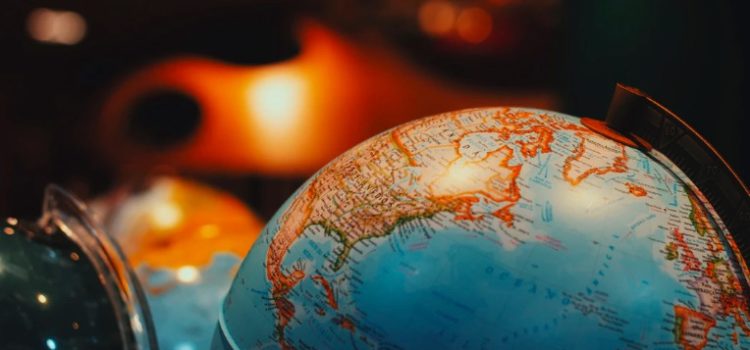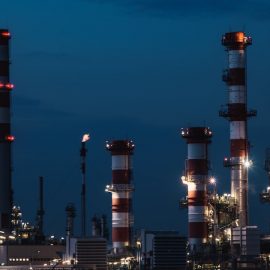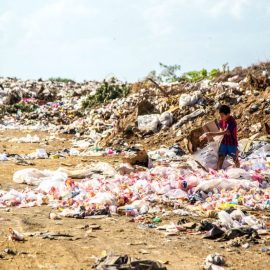

This article gives you a glimpse of what you can learn with Shortform. Shortform has the world’s best guides to 1000+ nonfiction books, plus other resources to help you accelerate your learning.
Want to learn faster and get smarter? Sign up for a free trial here .
Is society collapsing? What’s pointing to a potential downfall of Western civilization?
A societal collapse refers to the theoretical idea that a human civilization and its cultural identity will either become primitive or disappear. While no one knows for sure whether Western society will collapse, there are shocking signs that raise the question.
Keep reading to learn about four signs that could point to a future societal collapse.
Sign #1: Overexploitation of Resources and Possible Population Crash
The human population has skyrocketed over the past 200 years—we’ve gone from roughly one billion people on Earth in the early 1800s to over eight billion today. However, some experts now warn that humanity has grown too quickly, and sometime this century the population is going to plummet.
William E. Rees—a prolific population ecologist—recently published a study warning that humanity’s growth and resource consumption are unsustainable and a “population correction” is imminent. The ecological term for this is overshoot: Humans are consuming resources more quickly than the Earth can produce them, making it all but inevitable that we’ll eventually run out of food, fuel, or other crucial supplies. As a worst-case scenario, Rees believes a population correction could cause a societal collapse.
Furthermore, Rees contends we’re already seeing the impacts of humanity’s overshoot. The most notable of these effects is climate change, which Rees claims is happening because human activity (such as industry and agriculture) produces greenhouse gasses more quickly than nature can absorb them. In other words, overshoot includes the waste we produce as a species as well as the resources we consume—both are currently at higher levels than the Earth can sustain.
Rees says that we sustain our population growth by overexploiting the world’s resources and generating large amounts of pollution. Therefore, we’ll soon reach a point where the planet can no longer sustain all of us—we’ll run out of resources such as fossil fuels, and/or large areas of the world will become uninhabitable. According to biologist Paul Ehrlich, billions of people are malnourished and suffering from harsh climate change because of over-consumption. If the problem gets worse, Ehrlich says billions of people could die because the planet simply can’t support them (alternatively, Rees believes starvation won’t necessarily be the sole cause of a population crash). At that point, a societal collapse could occur because these people belong to certain cultures, possibly making them extinct altogether. In a similar instance, the Rapa Nui people of Easter Island saw their society collapse because of the overexploitation of resources that resulted in starvation, a population crash, and more extremely, cannibalism.
Sign #2: Polarizing Politics
The second sign that we might face Western society’s collapse is how much politics is dividing nations. Humanity as a whole will never agree on the same values, nor has it ever. But, politics has become a violent debate that reaches new levels.
Humans are radically divided, making it difficult to come together to fix problems that could lead to society’s collapse. According to Why We’re Polarized by Ezra Klein, polarization creates a set of dynamics in American politics that make it a winner-take-all contest between the two parties. The dynamics of polarization, he writes, create a positive feedback loop: Partisan voters feel increasingly hostile toward one another and reward politicians who deliberately antagonize the other side, driving further rounds of polarization. This political divide sometimes leads to protests, many of which have infamously turned to violent and illegal methodologies in order to accomplish their goal.
Meanwhile in European countries, strong political divides are growing between urban and rural populations, evident by the UK 206 Brexit vote and the Yellow vests protests in France. In a 2021 study, Michael Kenny and Davide Luca point to how a large number of voters living in the suburbs, towns, and rural areas of European countries are less likely to trust the political system. Similarly—although more extremely—the Roman empire experienced a massive wave of political violence and unrest that led its citizens to distrust their own leaders, contributing to its own societal collapse.
Identities Over Issues
Klein observes that our partisan differences stem less from disagreements about what we believe than about who we are and who we believe our opponents to be. In other words, identities, not issues, are what drive our political behavior.
He writes that our disagreements run far deeper than straightforward economic questions like, “Will this bill help improve the roads in my town?” or, “Which candidate or party will help lower the cost of prescription drugs?” Instead, partisanship operates at a more fundamental, tribal level: We support the party that we believe represents people like “us” and that will help us defeat and punish the hated “others.”
In Klein’s analysis, these identity-based politics transform political competition into an all-or-nothing, us vs. them struggle marked by a phenomenon political scientists call “negative polarization”—we hate and fear the other political coalition more than we love and admire our own. In other words, loyal Democratic Party voters aren’t Democrats because they have deep love and admiration for the Democratic Party and all it stands for. Instead, they have an abiding fear of and hatred toward the Republican Party, and they view the Democrats as their only bulwark against them.
Klein writes that this level of extreme partisanship makes democratic governance all but impossible. After all, you can’t compromise or accept the normal give-and-take of democratic governance (like losing elections), because to do so would risk letting the hated other side “win.” And when your partisan rivals are feared and despised rivals who you believe want to destroy everything you cherish (instead of merely being a group that you disagree with on routine political matters), you’ll inevitably come to see every election as an ultra-high-stakes contest. Ultimately, writes Klein, both sides develop a mentality of winning at all costs—because the other side is simply too radical, dangerous, and different to be trusted with power.
Sign #3: The Apocalyptic Weather
Geographer Jared Diamond argues that flourishing civilizations such as the Mayans, Greenland Vikings, and Pueblo peoples of Chaco Canyon were ultimately wiped out because they failed to address rapidly changing climates. Diamond identifies three indicators of societal collapse due to environmental change:
- Consistent pattern of environmental change
- Agricultural or industrial production making the crisis worse
- A systematic or governmental failure to adopt new means of production
Although the media and the world’s governments began to focus their attention on global warming in the late 1980s, Vaclav Smil (How the World Really Works) contends that we’ve known about the greenhouse effect and the dire consequences of increasing greenhouse gas emissions for at least 100 years. But, governments haven’t done substantial work to prevent global warming from worsening.
Around the turn of the 19th century, scientists calculated that a doubling of atmospheric carbon dioxide from preindustrial levels would result in significant warming—by one calculation, 4 degrees C, or 7.2 degrees F (which turned out to be fairly accurate). By 1958, scientists began measuring background concentrations of carbon dioxide in the atmosphere, and they showed constant and predictable increases over time.
While scientists have warned of global warming for some time, one reason the general public did not share that concern is because for decades people saw it as more theoretical than real. This disinterest began to change as global temperatures increased. The summer of 1988 was the hottest on record at the time, and drought and wildfires were widespread in the US. The media and the public began to pay more attention to climate change scientists. In 1989, the Intergovernmental Panel on Climate Change (IPCC) was established under the UN to provide a scientific perspective on climate change and its economic and political impacts.
Another reason the public’s opinion on climate change doesn’t always reflect that of the scientific community is that, especially in the US, global warming has become politicized. The issue began as a bipartisan one—for example, Republican George Bush campaigned as an environmentalist and helped launch the UN Framework Convention on Climate Change. But as it developed steam, fossil fuel interests took note and began to spend money on campaigns to oppose climate change action and portray it as a liberal position. Studies show that as of 2020, 78% of Democrats and 21% of Republicans say that climate change should be a top priority.
How Climate Change Affects Oxygen, Water, and Food
There are many aspects of a healthy environment, but Smil focuses on three that are necessary for human life: oxygen, water, and food. Smil believes that we are in no danger of not having enough oxygen, water, or food as a result of climate change—if we eat less beef, manage water more efficiently, reduce food waste, and change our approach to growing crops. However, if we don’t, society could possibly be at risk of collapsing. He outlines how climate change could speed up society’s collapse by affecting these three substances:
- Oxygen: Smil notes that we lose a tiny amount of oxygen every year (0.002%) due to burning fossil fuels, but it’s not enough to make a difference. There is no danger of us running out of oxygen, which makes up about 21% of the atmosphere by volume. He says the amount of oxygen in the atmosphere isn’t affected by the number of plants on the planet.
- Water: Smil says that we waste huge amounts of water, and people in many places don’t have enough water to drink. Climate change will cause some water scarcity, but he believes the bigger issue is the increasing demand for water as a result of a growing population. The solution is to reduce water usage, which the US has done successfully.
- Food: Producing food uses fossil fuels and also creates additional greenhouse gas emissions as a result of methane emissions from cattle and cutting down forests to raise cattle or grow crops. Smil explains that we need phosphorus from fertilizers to grow food, but phosphorus runoff, soil erosion, and phosphorus in animal and human waste can contaminate fresh and ocean water, causing large algae growths. Nitrogen runoff also causes these growths. When the algae in ocean water decomposes, it consumes oxygen, resulting in oxygen-depleted zones where sea life can’t survive.
Sign #4: The Rise of AI
In the past, civilizations have fallen because of other people invading their lands and destroying their empires. The Aztec empire fell after the Spanish, who had advanced weaponry, conquered the Nahua city state of Tenochtitlán, leading to an era of Indigenous erasure and religious conversion. With the rise of artificial intelligence in Western society, some experts worry that the technology could outsmart and conquer the current human race as a new type of intelligence.
Life 3.0 by Max Tegmark defines intelligence as the capacity to successfully achieve complex goals. Thus, an “artificial superintelligence” is a computer sophisticated enough to understand and accomplish goals far more capably than today’s humans. For example, a computer that could manage an entire factory at once—designing, manufacturing, and shipping out new products all on its own—would be an artificial superintelligence. By definition, a superintelligent computer would have the power to do things that humans currently can’t; thus, it’s likely that its invention would drastically change the world.
Likewise, in Superintelligence, Oxford philosopher Nick Bostrom contends that a superintelligent AI might pursue an agenda of world domination just because more power would put it in a better position to increase the value of its portfolio—whether by influencing markets, commandeering assets to add to its portfolio, or other means. It would have no regard for human wellbeing, except insofar as human wellbeing affected the value of its portfolio. And since human influences on stock prices can be fickle, it might even take action to remove all humans from the market so as to reduce the uncertainty in its value projections. Eventually, it would amass all the world’s wealth into its portfolio, leaving humans impoverished and perhaps even starving humanity into extinction.
The rise of artificial superintelligence could create numerous challenges that we as a society need to manage if we want to avoid a societal collapse, such as: AI-enhanced weaponry that could potentially wipe out civilizations.
AI advancements could drastically increase the killing potential of automated weapons systems, argues Tegmark. AI-directed drones would have the ability to identify and attack specific people—or groups of people—without human guidance. This could allow governments, terrorist organizations, or lone actors to commit assassinations, mass killings, or even ethnic cleansing at low cost and minimal effort. If one military power develops AI-enhanced weaponry, other powers will likely do the same, creating a new technological arms race that could endanger countless people worldwide.
Society Can Still Be Saved
The above problems might feel inevitable and overwhelming, but there are solutions to them. The solutions might not erase all of the world’s problems, but they’ll certainly reduce them if humanity steps in.
Population Crash – Some scientists believe that human ingenuity will continue to overcome barriers (such as limited resources) to population growth, as it has done ever since the invention of farming allowed Neolithic humans to produce their own food. For example, biologist David Sinclair points out that estimates about the maximum population are generally based on the technology that exists when those predictions are made. By the time the population reaches the predicted number, the actual maximum could be much higher.
Polarizing Politics – Getting everyone on the same page and viewpoints isn’t impossible, but it’s not entirely realistic. People are entitled to their own beliefs and telling them otherwise overthrows democracy. Why We’re Polarized recommends a set of reforms to American political institutions that he argues will reduce politicians’ incentives to stoke division and resentment by forcing them to compete on a more level playing field. Three reforms Klein proposes to break up this push toward ever-greater polarization are:
- Replacing the Electoral College with a direct popular vote for the presidency
- Creating multi-member districts
- Changing the rules of the US Senate to eliminate the filibuster
Climate Change – Like politics, climate change won’t be easy to fix because people are divided on how dangerous it really is to society. How the World Really Works argues that we need to reduce energy use in all areas—transportation, buildings, agriculture, and industry—to cut down on carbon emissions. Two primary ways to do so are by generating electricity from renewable sources and by using nuclear energy.
AI – Because there’s little we know for sure about the future of AI, Life 3.0 contends that one of humanity’s top priorities should be AI research. The stakes are high, so we should try our best to discover ways to control or positively influence an artificial superintelligence. The more humans who are willing to empathize and cooperate, the greater the chance that we’ll develop AI safely and with the intent to benefit all of humanity.
- Tegmark recommends cultivating hope grounded in practical action. Before we can create a better future for humanity, we have to believe that a bright future is possible if we band together and responsibly address these technological risks.
Final Words
These discussions about Western society possibly collapsing aren’t fun, but ignoring the problems could speed up the process. If you want a better life for yourself and future generations, then take action to help fix the above problems.
Do you believe society is collapsing? Let us know your thoughts in the comments below!

Want to fast-track your learning? With Shortform, you’ll gain insights you won't find anywhere else .
Here's what you’ll get when you sign up for Shortform :
- Complicated ideas explained in simple and concise ways
- Smart analysis that connects what you’re reading to other key concepts
- Writing with zero fluff because we know how important your time is






